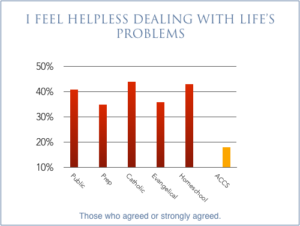March 8, 2021 | Good Soil
Missing Pieces: Good Soil (2)

There I was again, sitting next to a middle schooler at Homework Club, staring at her workbook full of complex math problems. She looks up at me wide-eyed, “So….what do I do?” I start talking her through the problem, breaking it down step-by-step. But even when I break it down to the smallest parts (“Let’s start here, what’s 8 times 3?”), it’s like pulling teeth. She screws up her face, trying to solve 8 times 3…she finally guesses, is wrong, and is now embarrassed. “I hate math, this is stupid anyway, let’s just skip it.”
Whether it’s trying to solve high-level math problems without having memorized the facts, trying to write a research paper without understanding basic grammar, or doing a project about World War II without having any clue where that event falls in history, this is a scene that plays out over and over again in the weekly Homework Club that I run for my neighborhood public school kids. It’s not the fault of these students – they are endlessly bright and eager. Yet, they arrive in middle and high school with large gaps in their education and a feeling of hopelessness.
In the eight years I’ve spent working with them, one element I keep coming back to is that their schools fundamentally lack harmony. Various teachers and different subjects each seem to exist in silos. Without a cohesive vision and a unified approach, there is so much falling through the cracks for these kids. And they feel it deeply. I’ve seen so many of them as eager elementary school students grow frustrated and apathetic as they reach the higher grades. They know that they don’t have the tools to flourish, and it deeply affects their sense of self and their sense of capability to take on challenges. It made sense to me when Keith McCurdy, a counselor who recently did a wonderful parent training in our community, detailed the connections between the rise in childhood anxiety and a feeling of helplessness.
For Christian parents, there is an even deeper dissonance that must be addressed. To grow secure, Christian children in public school must rely on and trust their adults in both home and school; yet, those adults send opposing messages. This huge dissonance in the formative years creates a chasm that prevents harmony of mind and soul in the teen years and beyond. Living regularly in discordant, disparate spaces at formative ages can spur apathy, increased anxiety, and many other symptoms. Children need harmony in their lives. They want things to make sense and to fall rightly into place with what they know of the world. For children to flourish, there should be cohesion in the curriculum of all the subjects they’re learning, unity among teachers, and trust between administration and parents.
In classical Christian education, there is deep harmony imbued in what we do because everything is filtered through the lens of the Great Story: Creation, Fall, Redemption, Restoration. Every day, our students are coached to see all of life through this Gospel worldview. It brings the ultimate harmony to all subjects; we see how Grammar songs, History dates, Math facts, and Literature heroes all have a purpose and a place in understanding God’s design of the world. There is a framework through which we can make sense of a big, sometimes scary world because we know the Truth that underpins it all. It gives our students both the practical academic tools and also the deep-rooted sense of identity in who they are and how the puzzle pieces of life fit together.
I wasn’t at all surprised to see the results of the Good Soil report in this area. As a teacher in this classical Christian school, it is a joy and privilege to set my own students up for these best life outcomes and to be part of such a unified team.

